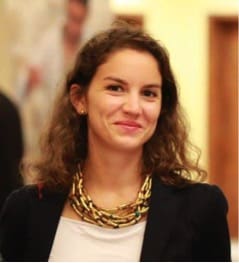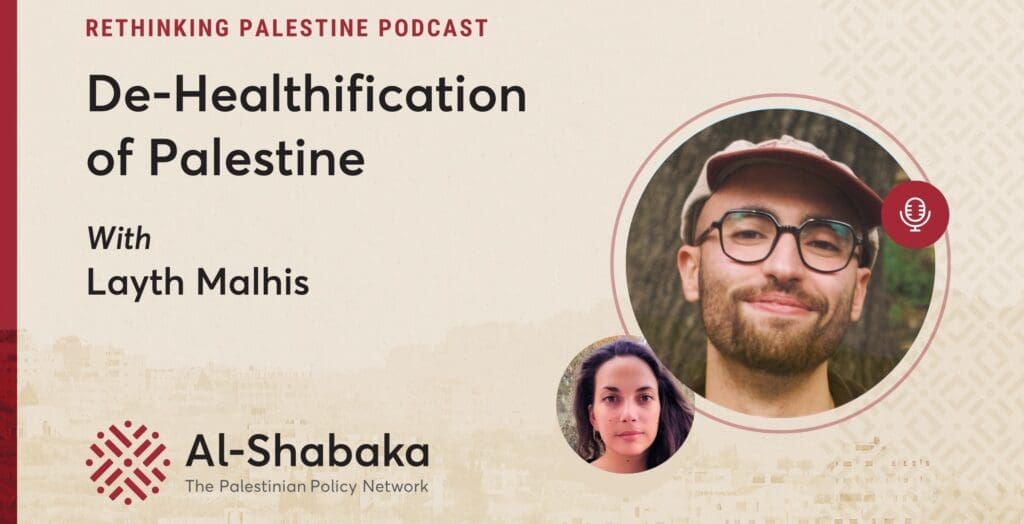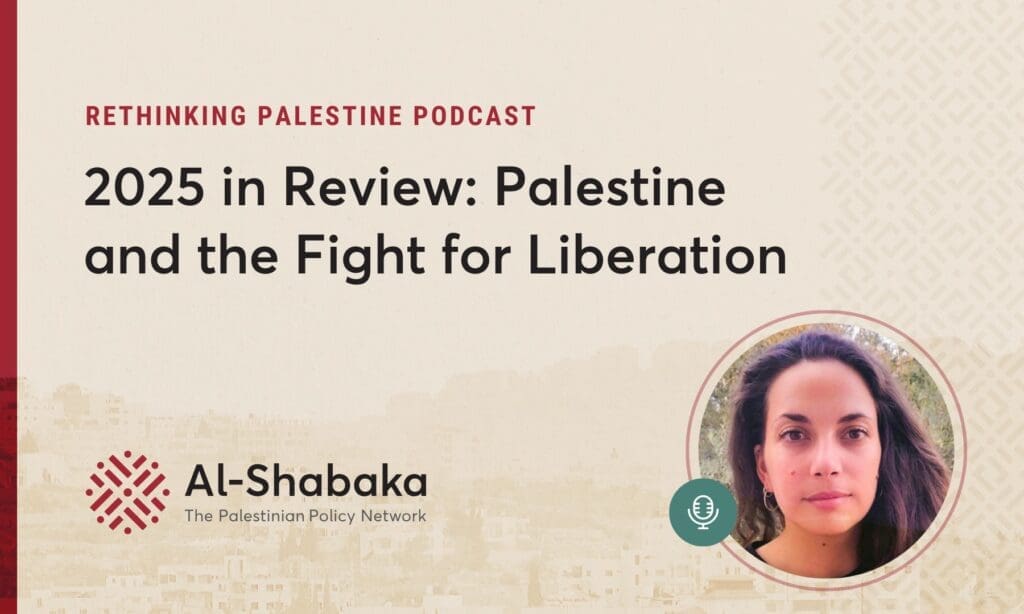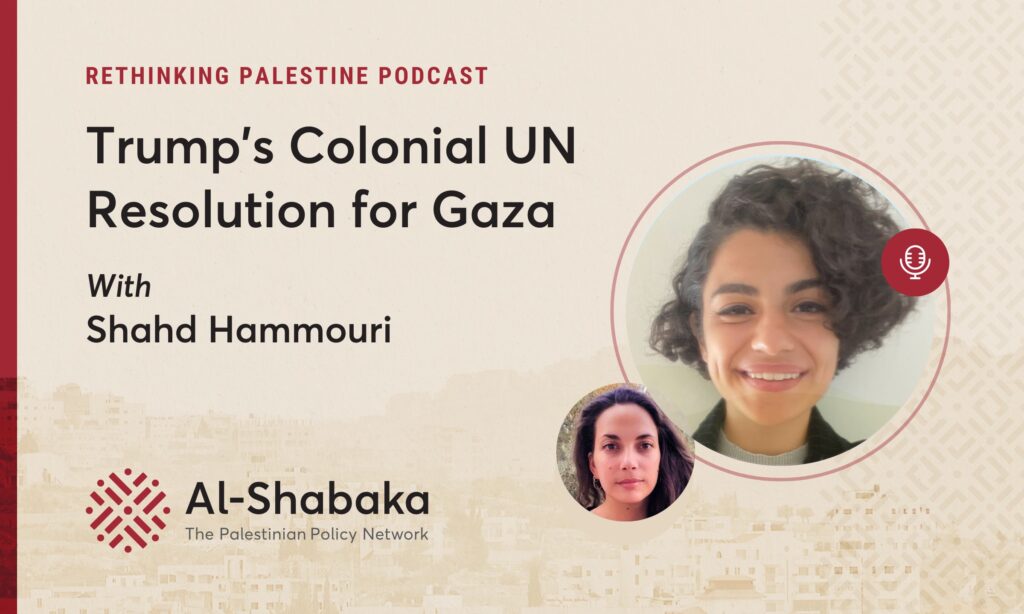About This Episode
Episode Transcript
The transcript below has been lightly edited for brevity and clarity.
Inès Abdel Razek 0:00
These projects are not new. The people-to-people projects have been actively promoted and millions have been poured into them after the Oslo Agreements, but it has shown that it has not worked because we’re here today and Israel has only been able to cover up its crime and to continue its dispossession through active Impunity through partly this greenwashing.
Yara Hawari 0:28
This is Rethinking Palestine, a podcast from Al-Shabaka, the Palestinian Policy Network. We are a virtual think tank that aims to foster public debate on Palestinian human rights and self-determination. We draw upon the vast knowledge and experience of the Palestinian people whether in Palestine or in exile to put forward strong and diverse Palestinian policy voices. In this podcast, we will be bringing these voices to you so that you can listen to Palestinians sharing their analysis wherever you are in the world.
At a conference in February of this year, Israeli president Isaac Herzog, announced his vision for a regional partnership to create a renewable Middle East. Herzog spoke of joint environmental threats, especially around water resources, and claimed that they can only be solved by cooperation. Herzog has already visited Greece, Cyprus, and Turkey, and has stated that he hopes that the corporation will include Egypt, the Gulf countries and Palestinians.
This discourse of Israel being a champion of environmentalism in the region is not new. Indeed, the Israeli regime has often used a tactic known as greenwashing to improve its image. Greenwashing in general is an attempt to use certain environmental initiatives to hide behind the fact that it actually causes more damage than it does to help prevent climate change.
Now globally, the climate crisis is fueled by inequality and engineered by complicit governments and corporations that put profit before people and the planet. Everywhere the least powerful are the most affected. The Israeli regime uses greenwashing to cover up the disastrous impact is having on the Palestinian environment and landscape, and Palestinians living under Israeli occupation and apartheid with no control over their land or natural resources, are highly vulnerable to the climate crisis.
Some have even been calling this a form of climate apartheid. In this context and in the context of renewed USAID to the 1967 Palestinian occupied territories that is directly funding money into normalization projects, eco-normalization or environmental normalization initiatives, are on the rise. To discuss this with me on this episode is Inès Abdel Razek, advocacy director at the Palestine Institute for Public Diplomacy and Al-Shabaka policy Member. Inès thank you so much for joining me on this episode of Rethinking Palestine.
Inès Abdel Razek 2:45
Thank you, Yara. It’s good to be home, almost.
Yara Hawari 2:49
So Inès I think our listeners are aware of the concept of greenwashing, but perhaps you could explain it a bit more in the Palestinian context and also in the context of renewed USAID funding and explicit support for people-to-people projects.
Inès Abdel Razek 3:03
Yes, thank you Yara and I think you also outlined some in your introduction. In our particular context, I think such hypocrisy that lies behind the concept of greenwashing is probably better understood through the prism of green colonialism and even green settler colonialism. So the Zionist project has been a settler colonial endeavor as also recognized by its founders, Herzl, Ben Gurion and others. Until colonialism was recognized as harmful and not so popular. So Israel actually moved to deny it was. So what it has meant is this continued practice to replace the native population, the Palestinian population with an outside settler population, here the Jewish people.
And it was primarily advanced through mechanisms of land dispossession, displacement, and also natural resources appropriation and exploitation. So we’re talking mainly land, and water, but also minerals by controlling the Dead Sea or stones controlling quarries in the West Bank. So greenwashing, as you said, is not new and this green colonialism has been taking the form of the Jewish National Fund, planting non-indigenous, non-endemic trees on top of Palestine villages they demolished in 1948 and 67, but also creating environmental reserves on lands annexed and taken from Palestinians in the West Bank, et cetera.
And I think what’s important to get to the international donors’ intervention in USAID is that, so Israel has built its diplomacy and prosperity by exploiting such colonial domination and taking advantage of basically this dispossession of Palestinians, particularly through developing like agro technologies, green technologies, water-efficient technologies that, that they’re exporting around the world.
And these have fundamentally been structured and developed around the dispossession of Palestinians. And so in the context of international donor interventions in USAID, they’re actively I think normalizing that dispossession. They’re normalizing entrenching these domination structures and playing into promoting Israel as this beacon of a fight against the climate crisis, against the environmental crisis.
And so it basically denies these dire asymmetries of power that exist here and the denial of rights of Palestinians and the denial of agency of decision-making power of Palestinians. So it’s presenting these projects promoting corporation between Israelis and Palestinians.
That means either it’s the Palestinian Authority or NGOs or the business sector as one of corporation and peacebuilding. So instead again, of recognizing that as asymmetry of power, it’s presenting the situation and normalizing and trying to present the situation as one of a dispute among two parties with equal rights. One post-conflict situation where trust and dialogue could solve the injustice instead of again looking at reality.
Yara Hawari 6:12
So Inès, what might some of these environmental normalization projects look like? Can you give us some concrete examples?
Inès Abdel Razek 6:21
Yes. So I can give an example in the context of this renewed USAID intervention in Palestine. They are very much trying to promote the implementation of the Abraham Accords, the normalization agreements between Israel, the UAE, Sudan, Morocco, and more indirectly Saudi Arabia. So. One of these projects, for example, is called Prosperity Green and Prosperity blue. It’s very much private sector oriented, which also poses the problem of making resources like water and energy, commodities, and especially water, which is a right, making it a commodity to be traded.
But more importantly, the problem with this project is exactly that Palestinians are completely absent from these projects, and it’s basically here to promote UAE investments and Israeli investments and interests and completely erase Palestinians from the picture. So, this project is about producing renewable energies in Jordan and exporting it to Israel so that they desalinate water that then they would export again to Jordan. So this kind of exchange where again, we see that the Palestinians will either receive or be sold some water by the Israelis, the very water that Israel stole from them or they will be completely erased from the equation so far. And what’s interesting is how again, the US is presenting it, so Kerry said the Middle East is at the front line of the climate crisis, and only by working together can countries in the region rise to the challenge. And he also said that this is a welcome example of how corporations can accelerate the energy transition and build greater resilience.
So we very much see the exploitation of the climate change needs and the climate crisis into normalizing this type of project where effectively Palestinians continue to be dispossessed of their renewable resources by Israel as a colonial power. And unfortunately, they’re very, I think, popular because who doesn’t love, again, corporation, peace, and renewable energies?
All of these things look very nice on paper and politically. So that’s how they’re really receiving such support. And I think an interesting other example is one that has failed is the so-called Red Sea-Dead Sea Canal. Which was supposed to have water from the Red Sea desalinated and then the brine transferred into the Dead Sea.
And again, this project has failed. The Palestinians were very critical of it, mainly NGOs because the PA had signed the MOU for this project to happen, they were a bit forced into it. But what this project has shown is that eventually, it would have normalized it, it would have normalized the annexation of Israel to control the Dead Sea. I mean, the Dead Sea is in the occupied West Bank. Yet this project received support from the World Bank, the US, and the international donor community, despite this tremendously problematic approach.
Yara Hawari 9:36
If you are enjoying this podcast, please visit our website, www.al-shabaka.org, where you’ll find more Palestinian policy analysis and where you can join our mailing list and donate to support our work.
I think it would be a good idea just to pause for a minute and define what normalization is because some of our listeners might not be so aware. Normalization is the act of treating the Israeli regime as a normal entity as opposed to an apartheid regime and anti-normalization as a concept and a political practice has been agreed upon by the majority of, by consensus, by the majority of Palestinian civil society.
And as you talked about why these projects are so harmful, and one of the main issues is the asymmetry of power that is presented through these projects. But I was hoping you could expand a bit further as to why these initiatives and projects have such negative impacts on Palestinians.
Inès Abdel Razek 10:37
Yeah, I think the primary political impact as mentioned is that it erases, but it normalizes the dispossession at play by Israel from Palestinian resources and the denial of Palestinian rights to their resources. So when you’re looking at promoting, for example, dialogue on water issues between Israelis and Palestinians, or on renewable energy having Israelis present, for example, them providing trucks of water to the Palestinians, or agreeing to cooperate on building some solar panels for Palestinians. What that means, is it normalizes this colonial and patronizing approach, but it erases completely what’s happening on the ground. What’s happening, in reality, is that there is constant land confiscation and expropriation of Palestinians from their land expulsion of rural, rural communities to build settlements.
There is active water dispossession, I mean, Palestinians are only allowed to use 15% of the groundwater in the West Bank. We have to look at the fact that the renewable sources of water present in Palestine are many underneath the West Bank. So inside Palestine, Israel controls more than 85% of that and then sells back the water at very high prices to Palestinians.
It also raises the fact that again, Palestinians are given zero access to renewable sources of water of the Jordan River or the Dead Sea. It erases the fact that, again, rural communities in the Jordan Valley are denied digging any wells or denied being connected to water.
So I think again, the hypocrisy of this kind of dialogue or trust-building project is that it allows Israel to present itself as a good faith actor as someone who’s ready to make a gesture when in reality, all of what this international diplomacy and normalization agreement and Abraham Accords do is entrenching and facilitating them continuing that dispossession and the environmental impacts are also extremely serious and they have been over decades. I mean, the agriculture sector of Palestine has shrunk. Farmers have stopped, doing agriculture because it was so costly, because of the lack of water, and because of the lack of access to land. So Palestinians have been denied food sovereignty and food security.
We’re looking also at the denial of infrastructure. Especially the PA for years has been asking to build infrastructures like solid waste management, wastewater management, and renewable energy but that has constantly been denied by Israel because it’s located in areas that they wanna keep under their control and are annexing.
So this has obviously had tremendous environmental impacts. Why? Because then Palestinians resort to other sources of energy like fuel. This is particularly dire in Gaza, under siege, where Israel has bombed the only water power plant and Gaza relies on fuel that is extremely polluting and it’s harmful for people’s health.
Yet, the World Bank and USAID will be promoting projects of building solar panels in Gaza or treating some of the wastewater along the beach and then say that this is a wonderful corporation. So these are just some of the concrete impacts that we see that, again, maintain Palestinians under the full control of Israel and their interest and will. And it also has I think long-term impacts on people’s health and for climate impact.
Yara Hawari 14:32
Inès, I know you are interested in the case of water and you’ve worked in the water policy field and we’ve already discussed water quite a bit during this podcast. But I was hoping you could tell us a bit more about what you’ve observed about recent water normalization.
Inès Abdel Razek 14:50
Yeah, I think it’s, again, interesting in what’s happening with the Abraham Accords that are putting at the forefront again, this approach of peacebuilding, dialogue, and people to people’s approach. I think the discourse there and the political approach is really promoting water and environment as sectors that could be put first in terms of, before looking at political issues or what is considered more difficult issues than water and environment that’s kind of taken as sectors where it would be easier to build again, that trust and dialogue. And I have seen that at play over the years. So, for example, in 2009 you had the World Bank that has released a report on water saying that the main obstacle to the development of the water sector for Palestinians is the Israeli occupation.
It’s the obstacles that are documented in a hundred-page report. That report was actively lobbied against by the Israelis and the World Bank since then has completely erased this political analysis of reality, and it has depoliticized completely its approach and rather move towards, again, promoting this normalizing of the situation instead of looking at the root causes.
And so we are here today where this green-blue piece is promoted again when we know that effectively again, it’s erasing the root causes and it has tremendous support from the International community receiving international awards, being invited at the UN Security Council to present this sort of peacebuilding approach.
And it has been years that these initiatives have been existing, of water diplomacy of using this informal, what we call track two diplomacy to bring Israelis and Palestinians together to discuss some of these sectorial issues. But in reality, all these initiatives, like the Geneva initiatives, have been evaluated as not efficient.
So for example, the Swiss government has removed its funding to the Geneva Initiative. And I think what has been done is again to continue to promote this empty mantra and this political discourse that is completely disconnected from reality instead of looking at the root causes.
And so it’s almost like I think people can see behind, I think some people can see behind that propaganda, I think it’s disinformation to bring about terms like peace or cooperation, when in fact it’s completely imposed projects, imposed investments on the majority of Palestinians.
Yara Hawari 17:36
And these projects tell Palestinians to forget the, as you said, to forget the macro destructive regime, and instead, it tells them to focus on these small micro issues that will then be turned into this propaganda opportunity in which this narrative is pedaled where Palestinians and Israelis simply need to get along for an end to the so-called conflict. Not that the Israeli apartheid regime needs to be dismantled, and I think some of our listeners might be a bit confused as to why Palestinians would participate in these kinds of projects.
Of course, these are normalization projects so there must be Palestinian participants. And I think the confusion is fair, especially as there is a very clear consensus on normalization within Palestinian civil society, and of course everything you mentioned as to how these projects are actually very harmful.
So what are the benefits for Palestinians who do participate and what are the reasons? What do you think the reasons are behind their participation?
Inès Abdel Razek 18:45
I think we need to distinguish between how the Palestinian Authority has been participating, how the business sector has been participating, and how civil society has been participating. We have to look at first, the Palestinian Authority signed the Oslo Agreements, which in themselves were putting the PA in a place of domination, especially when we look at the water sector. The Oslo Agreements only gave 80% of the control of the renewable sources of water to the Israelis, whereas Palestinians would be given a certain bulk of water. That was supposed to be temporary but the same exact amount is still one given today to Palestinians 30 years later.
So that’s one. And it has also created these mechanisms again for Israeli and Palestinian bilateral discussions. So instead of looking at the dire asymmetry of powers and recognizing that there should be an end to the occupation and apartheid, it did just create those mechanisms called the joint water mechanism, the joint water console, where you would have the Israeli government, the PA discussing the projects for Palestinians, and the vast majority of the projects, again, of infrastructure projects presented by the PA, were denied.
So you have the PA that has been trapped into its own domination and in order for Palestinians in the very little islands that the PA controls, or at least where it controls civil matters like water and education, they have had to surrender basically to what Israel authorized them to.
So it means that for the PA it’s better to have one pipeline for water and two trucks of water instead of zero. So that’s how it has been playing out is that eventually in order to receive and to have access to the minimal amount of water, even if it’s not your right to water, even if it’s too little, even if you still get dispossessed from water elsewhere, you still have to accept some of these breadcrumbs in order to function at a minimum level and to give services to some of the population.
And the business sector, well, some of the business sectors and companies have eventually benefited from the occupation. I mean, a lot of people know that there have been Palestinian companies that have built the wall. So I think in the case of the business sector, there are private interests at play because again, when you transform water or land, or energy into commodities that become just privatized and you privatize let’s say, the efforts that should be public into protecting public goods into, again, people having access to water and to land as a right. Some companies also are benefiting from these, these types of projects.
So in the case of the new green prosperity and blue prosperity between Jordan, UAE, and Israel, some Palestinian companies might have stakes in, whether it’s the solar energy panels or some of the desalinated water within Israel. And so I think that’s important to keep in mind that again the private businesses don’t have the general interest at play in general. And when it comes to Palestinian civil society, I think at the individual level, I think you said right, that, I think when you’re an individual and you live under extreme oppression, repression, stress, and dispossession you can feel the need for some empathy and for some sort of normal, and that’s why I think a lot of Palestinian individuals might think that by sitting together with an Israeli, by discussing around a table they’re given some agency, they’re listened to and, and this is obviously promoted and actively prompted also by international western liberal approaches, so people feel listened to.
But the fact of the matter is, is that even if you create some form of empathy in a room, as you said, it doesn’t change the fact that the Palestinian go back home under unequal rights, still under apartheid, still deny their fair access to water, still deny their access to land. And the Israeli goes back to being the dominant whose prosperity is built on Palestinian dispossession. And so I think it’s normal humanly for some Palestinians to think that these types of projects could change things. But over the years, again, these projects are not new. The people-to-people projects have been actively promoted and millions have been poured into them after the Oslo Agreements, but it has shown that it has not worked because we’re here today and Israel has only been able to cover up its crime and continue its dispossession through active impunity, through partly this greenwashing.
Yara Hawari 23:44
Inès, thank you so much for that. I think we’ll leave it there for today but I hope you’ll join us again on Rethinking Palestine.
Inès Abdel Razek 23:52
Thank you, Yara, my pleasure.
Yara Hawari 23:58
Thank you for listening to Rethinking Palestine. Don’t forget to subscribe and leave us a review. For more policy analysis and to donate to support our work, please visit our website, www.al-shabaka.org. You can also follow us on Facebook and Twitter.
Inès Abdel Razek is the Executive Director of the Palestine Institute for Public Diplomacy (PIPD) and its digital platform Rabet, an independent Palestinian organization focusing on international mobilization and digital campaigning for Justice, Freedom and Equality. From 2019 to 2022, Inès was the Advocacy Director of the PIPD, helping to develop the political networks and international advocacy pillar of the organization. Prior to joining the PIPD, Inès held policy advisor positions in the Union for the Mediterranean in Barcelona, the UN Environment Programme in Nairobi and the Palestinian Prime Minister’s Office in Ramallah, where she advised executive leadership on international aid for development policies. Inès is also a board member of the social enterprise BuildPalestine, Advisory board member of Palestine DeepDive, and policy member at Al-Shabaka, the Palestinian Policy Network. She holds a Master’s degree in Public Affairs from Sciences-Po, Paris. Twitter: @InesAbdelrazek
Al-Shabaka: The Palestinian Policy Network is an independent, non-partisan, and non-profit organization whose mission is to convene a multidisciplinary, global network of Palestinian analysts to produce critical policy analysis and collectively imagine a new policymaking paradigm for Palestine and Palestinians worldwide.

















